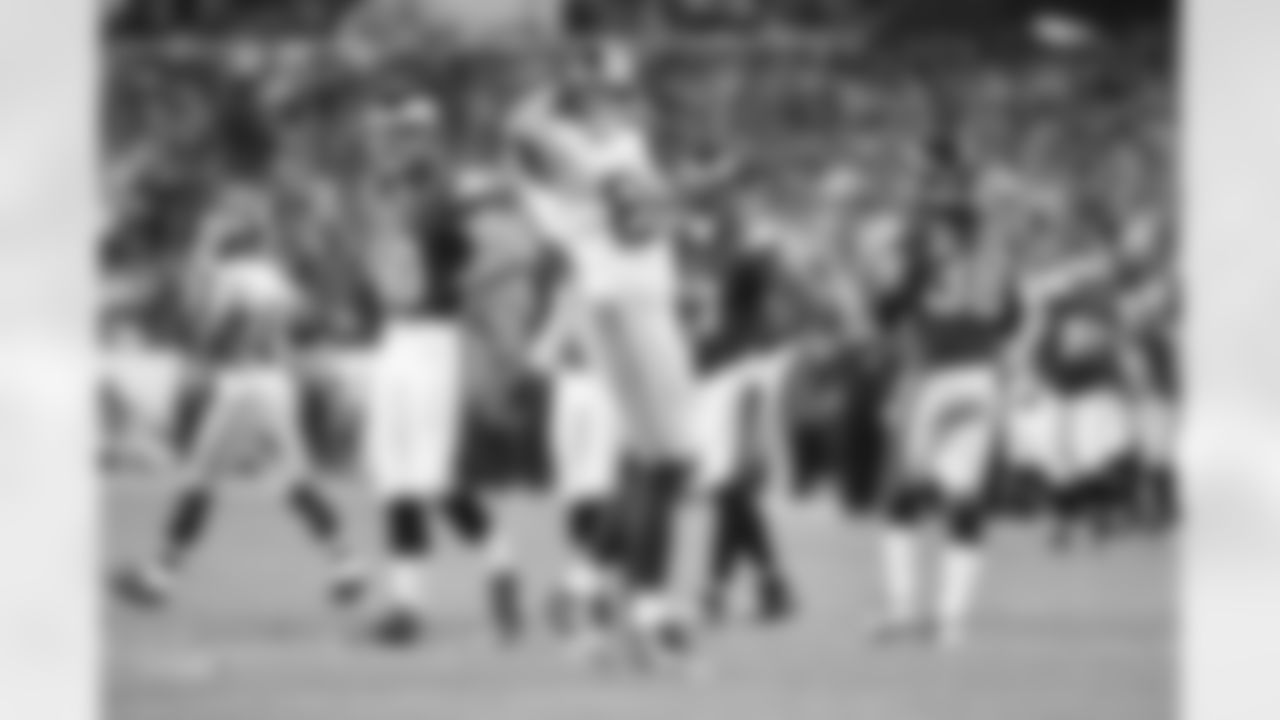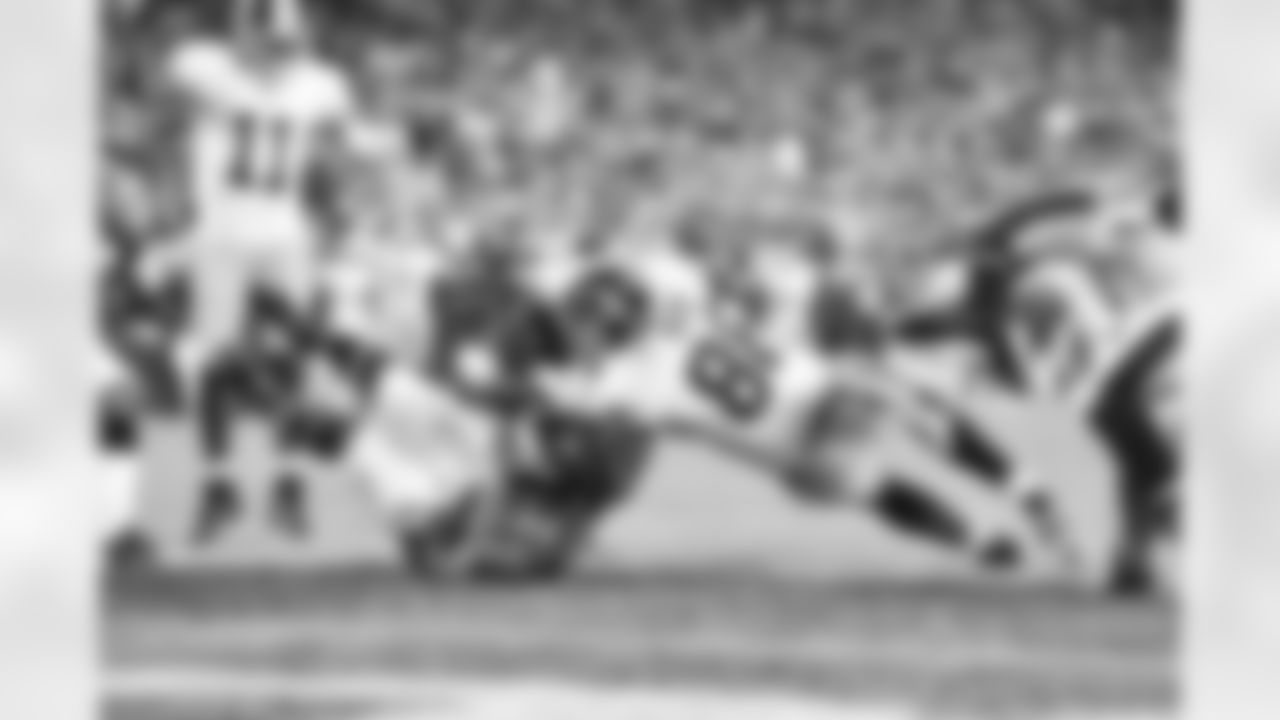Here's five takeaways from Redskins general manager Scot McCloughan's media session with reporters from the 2016 NFL Owners Meetings March 22, 2016, in Boca Raton, Fla.
1. McCloughan continued his mantra about free agency: it's good to fill team needs, but drafting and developing your own players is preferred.
The free agency period started at 4 p.m. ET March 9 and, almost immediately, several teams across the NFL started handing out huge – in some cases, unprecedented – amounts of cash for players they're betting will become cornerstones of their franchise.
The Redskins, as predicted, took more of a "wait-and-see" approach. While most of the big-name guys quickly got swiped up in other cities, Washington elected to take its time and, first, take care of its own players from the previous season, and then go out and sign guys like Kendall Reyes, David Bruton Jr. and Terence Garvin.
"The thing that's scary about free agency is you always overpay," McCloughan said. "That's why I think it's important to draft well, so when you overpay you know who they are and what they are."
The second-year Redskins GM said the team had discussions with and about several other free agents – and could still make a couple additional signings (see below) – but once the price tag starts getting out of the team's range, it's not interested in continuing those talks.
"I'm not going live – and we as an organization are not going to live – in free agency, but if we have an opportunity to make us better for the right price, we're going to stay in 'em," McCloughan said. "All the sudden if the value gets much higher than we think its worth, and then we're out."
READ MORE: Scot McCloughan: ‘I want 12’ Draft Picks
2. Long-term contract talks with quarterback Kirk Cousins are "still in the process," but if he plays the 2016 season on the franchise tag, then McCloughan is OK with that.
The Redskins and Cousins cleared one hurdle just before the start of free agency by inking the record-setting quarterback to the franchise tag – worth almost $20 million in guaranteed money – to ensure he stays around for at least the 2016 season.
From here, the two sides essentially have two options: Cousins can simply play out the franchise tag in 2016 and see where they're at after the season, or they have until July 15 to reach a multi-year deal.
McCloughan said the mid-July deadline is certainly a "time restraint," but, long-term deal or not, he knows Cousins is going to be all-in for this season no matter what.
"It's a one-year deal and he signed the tender and he's going to be around every day in the offseason, working out like the ways he does," McCloughan said.
McCloughan also admitted that by locking Cousins into a deal for the 2016 season, it has allowed the team to begin focusing on other areas of the depth chart. Though a long-term deal at this point would be the best-case scenario for both sides, "as of right now, we don't have that availability" to go all-in financially for the quarterback.
Either way, McCloughan said money is not a factor for Cousins.
"He wants to be a Redskin, he wants to understand that it's his team and we're going to go do special things, he wants to be the quarterback," McCloughan said. "You know, as a person, I respect that so much because I've been around players in the past that were all worried about just the money, and he's not. He's worried about a good team."
3. Long-term deals are preferred, but recent one-year contracts given by the Redskins can be beneficial both ways, too.
Take the recent re-signing of pass rusher Junior Galette, for example.
In training camp last year, it was the Redskins and McCloughan who first reached out to the linebacker upon his unceremonious release by the New Orleans Saints, offering support but strict guidelines to follow if he signed.
Galette signed a one-year deal, and was just really starting to show the coaching staff and his teammates what he could do when he torn his Achilles just before the start of the season.
So come free agency this year, Galette certainly could've wandered to other teams' offers, but he decided to stick with the Redskins and McCloughan, again on a one-year deal, which is good for both sides.
"It's a two-way street. You know we can't just sit there and say, 'OK, no matter what it's going to be a four year deal or nothing,'" McCloughan said. "No, the agent comes back, he talks to the player, we identify what we need to identify. Coming off an Achilles injury, which is tough, we had to make sure, my standpoint is we have to take care of the organization. I want good football players and Junior's a good football player and we'll see going forward – you've got to produce in the NFL to get long-term deals."
Much like nose tackle Terrance Knighton's one-year deal that he signed with the Redskins a year ago, McCloughan said these short-term signings often put a chip on a veteran's shoulder.
"All of a sudden they say, 'Listen, I'll take less in the one year so I can prove myself and get a four- or five-year deal or a three-year deal the next year and get more guaranteed."
4. McCloughan thinks the world of free agent tight end Vernon Davis.
Could the Redskins sign Davis, one of the more productive tight ends in recent NFL history?
Take a look back at the top images of the Washington Redskins' tight ends from the 2015 season.



































McCloughan certainly still seems interested in doing just that, visibly lighting up when asked about the veteran free agent.
"Well I drafted him first of all," said McCloughan, the former 49ers general manager, before continuing on with a list of what makes Davis an attractive option. "He's from the area, he's in great shape. We brought him in – he's a football player."
Davis, an 11-year veteran, has amassed 461 receptions for 5,841 yards and 55 touchdowns. Twice he's recorded 13 receiving touchdowns (2009 and 2013) along with recording at least 500 receiving yards in a season six different times.
Davis also ranks in the top 20 all-time in touchdowns (seventh), receiving yards (15th) and receptions (tied for 19th with Todd Christensen) among tight ends.
Last season he was more of a role player in Denver with the Broncos, but McCloughan is confident Davis could still be a major factor for any offense, including the Redskins'.
"He can block, he can run, he can catch, and all of a sudden we add another weapon to the offense and D-coordinators are going to understand we're coming at him," McCloughan said of potentially adding Davis.
5. The re-signing of Colt McCoy gives the Redskins a player that is effective on or off the field.
McCoy has spent the last two seasons as Washington's primary backup quarterback, even taking over starting duties for a large chunk of the 2014 season after Robert Griffin III went down with an ankle injury and Cousins couldn't get it going with any amount of consistency.
He's seen as the ideal No. 2 quarterback: a guy who provides a ton of support in the meeting room and on the practice field, but legitimately pushes the player ahead of him – in this case, Cousins.
"The calling factor is the fact that he can play football and he's a solid, solid No. 2 right now that pushes Kirk," McCloughan said. "Kirk's our starter, we know that – you can see with the tag – but Colt's not going to back down. He wants to opportunity to force Kirk to be better, to prove what he is, and I respect that a lot, at any position, but especially quarterback."
In his two seasons with the Redskins, McCoy has played in seven games with four starts, completing 98-of-139 passes for 1,185 yards with five touchdowns to three interceptions. Should the Redskins need McCoy to take significant snaps in the next couple seasons, the team has total confidence in him.
"He's a Redskin through and through," McCloughan said. "He had opportunities to go elsewhere and he didn't accept them. He wanted to come back and I respect that a lot. You need two quarterbacks no matter what – hopefully Kirk plays all 19 next year, you know – but you never know. But we have absolutely no problem with Colt stepping out there and taking snaps for us."
READ MORE:Redskins Re-Sign Quarterback Colt McCoy
.
. .






